Your support helps us to tell the story
From reproductive rights to climate change to Big Tech, The Independent is on the ground when the story is developing. Whether it's investigating the financials of Elon Musk's pro-Trump PAC or producing our latest documentary, 'The A Word', which shines a light on the American women fighting for reproductive rights, we know how important it is to parse out the facts from the messaging.
At such a critical moment in US history, we need reporters on the ground. Your donation allows us to keep sending journalists to speak to both sides of the story.
The Independent is trusted by Americans across the entire political spectrum. And unlike many other quality news outlets, we choose not to lock Americans out of our reporting and analysis with paywalls. We believe quality journalism should be available to everyone, paid for by those who can afford it.
Your support makes all the difference.Rose Tremain lives in a Georgian house, at the top of a hill, on the outskirts of Norwich.
Entering her echoing hallway, the atmosphere is as peaceful and sophisticated as an art gallery. Upstairs, her husband, the biographer Richard Holmes, is working in his study and, if I were not here, Tremain would be working in her study which is off to the right of the living room. She’s hospitable, candid and laughs a lot. Perhaps it’s something to do with the way I sink into a low couch, while she answers my questions from an elegant armchair, with a view of the Norfolk countryside behind her, but meeting Tremain is an inspiring experience. She talks about personal and universal subjects in arresting language, in a way that feels almost as transporting and horizon-expanding as her fiction.
“They’re about loss of love, friendship, status and, in the end, life,” she says of the stories in her new collection, The American Lover, which were written over the past decade. Many of her characters are reflecting on pivotal moments which often involve heartbreak: “Love shakes your equilibrium, sometimes for magnificent reasons, sometimes for heart-breaking reasons,” she continues. “If your life is a line, love interrupts it in a catastrophic way. I’m interested in the way life can change in an instant.”
Readers should pace themselves (“One story a day or perhaps one a week”), allow stories space to resonate: “A story has to say something of substance with brevity. When a reader picks up a short story, because it’s proclaimed itself as something important, a clock starts ticking in their mind. That doesn’t happen with a novel. I want the reader to come away with the feeling that they’ve had something quite rich. They lose that if they gallop through the book.”
Tremain, who has published four previous collections, has always avoided autobiographical fiction. “I find drawing on my own life dull,” she says, but admits that her new book’s title story, which was shortlisted for the BBC National Short Story Award, is in part based on an affair she had in her early twenties with an older man. “What a mistake to admit that there was a real life Thaddeus,” she laughs, almost blushing. In the story, it’s 1964, when 19-year-old Beth is swept away by Thaddeus, a fortysomething American. “Perhaps we’ll skim over that,” says Tremain, before regaining her composure: “Although there is a shadow figure in my life behind Thaddeus, the progression of the story does not follow what happened. He wasn’t American.”

Sex in fiction should, she believes, “function like an aria in opera. It must move the story forward, if it doesn’t, then it’s gratuitous.” There are plenty of arias in this collection but Beth is “destroyed twice,” first when Thaddeus leaves her, then after she describes their affair in a novel. “She’s beginning to understand that writers live their lives twice. They live day-to- day then they live imaginatively.”
When was Tremain first drawn to this double life? “At 11, when I was at boarding school, one beautiful June evening, wandering in from a tennis match, I stood in a field with the scent of the hay, and the endorphin high you get from playing tennis, and thought: ‘This is beautiful but it’s not enough to experience it. I need to carry this in some way.’ I didn’t attempt to turn the scene into a story but it was a capturing of the landscape and my response to it.”
In her twenties, she read film scripts for a living before working as a teacher. She went on to teach creative writing at the University of East Anglia where she’s now Chancellor. “I find it an inspirational landscape,” she says of Norfolk, and two new stories are set there. Her first novel, Saddler’s Birthday (1976), was set among East Anglia’s “relative bleakness” but, although her early work received critical acclaim, her career took off with Restoration (1989), which introduced Robert Merivel, the 17th-century physician who’s also the eponymous hero of her most recent novel: “Restoration took me to a much bigger readership. Nowadays the publisher would have dropped me before I got to write it.”
Is it harder now than ever for writers to build careers? “I really think it is. It’s much more crowded. There are more and more courses, so you end up with more writers, fewer readers.”

This point, about the proliferation of creative writing courses, sounds slightly incongruous, coming from somebody who’s associated with UEA, which pioneered the subject in this country. Does she think things were generally better in the past? Hard to say but, later, I mention her story “The Closing Door”, set in 1954, in which a character thinks: “We still live in austere times, but people have not exhausted their reserves of compassion.” Is the same true of our austere times? “No. I grew up after the war and people were very careful of each other’s welfare, partly because of how much they’d suffered. The feeling that we lived in quite kindly times continued until the Thatcher years.”
In the same story, a mother feels bereft when her daughter leaves for boarding school. “I don’t know what to do,” the woman thinks, which encapsulates one of the central themes in Tremain’s fiction. From Polish immigrant experience in 21st-century London, in the Orange Prize-winning The Road Home (2008), to Merivel’s search for purpose and intimacy, her protagonists crave meaning. “They struggle with that question: ‘Why am I alive?’” she says. “If, like Merivel, you’ve lost your religious faith, if you’ve lost people you love, how can you make sense of each day? Around 60 you ask: ‘What will give my life meaning? Am I going to surrender my desire to explore? Or am I going to continue?’ That question of meaning is my subject.”
Now 71, Tremain is working on a novel about friendship and, while her male contemporaries, Martin Amis and Ian McEwan, bemoan their dwindling stamina, she says: “My imaginative power is as strong, if not stronger, than when I was starting in my twenties.” Daphne du Maurier and Leo Tolstoy appear as characters in two stories and Tremain reread both authors, as well as biographies, while writing: “Sometimes the research that goes in to making stories feel real is disproportionate to the tiny thing that comes out but I don’t mind because research is learning.” She feels this is “a good moment to present this collection to the world. I’ve still got a lot of energy for finding out about things and being lots of different people.”

Join our commenting forum
Join thought-provoking conversations, follow other Independent readers and see their replies
Comments